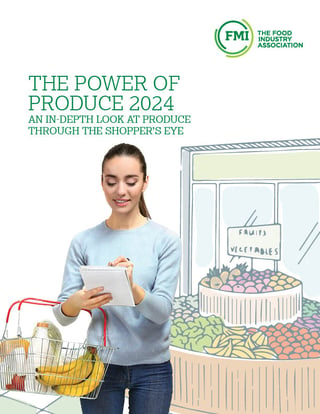Produce Shoppers Keen to Add Fruits and Veggies to Meals
According to this year’s “Power of Produce” report from FMI – The Food Industry Association, consumers are eager to incorporate produce into more meal occasions, reduce produce food waste and learn more about the nutritional value of fresh food, all of which translate into opportunities for growth in the category. For the sixth consecutive year, the report was released at the Southeast Produce Council’s Southern Exposure conference, in Tampa, Fla.
“Overall, the produce department performance has been solid, but we are seeing consumers being more deliberate in their produce purchases to avoid food waste,” noted Rick Stein, VP of fresh foods at Arlington, Va.-based FMI. “Food retailers and suppliers need to focus on helping shoppers with meal ideation and emphasizing the nutrition benefits of fruits and vegetables.”
[RELATED: How Schnucks Is Redefining ‘Local’]
According to the report, fresh fruit and vegetable consumption has fallen to a seven-year low across all meal occasions, presenting retailers with an opportunity to boost sales through a focus on increasing consumption frequency. Key areas for growth include providing shoppers with ideas for vegetable and fruit snacks, incorporating vegetables at breakfast and better-for-you desserts. For instance, 51% of produce shoppers want tips on how to add fresh fruit and vegetable snacking to their diets.
Offering in-store or online nutrition education for customers is a solid strategy to increase produce consumption, the report noted. Many consumers connect fresh produce with nutrition and health, resulting in higher consumption across various meal occasions when healthy eating is highlighted. The report found that retailers should emphasize health benefits, provide guidance on portion sizes and dispense practical tips for easily integrating fresh produce into all meal occasions.
Six in 10 Americans said that fresh produce waste at home is an expense they can’t afford, and 51% of shoppers have reduced the amount of produce they buy to avoid spoilage. Food retailers should be transparent about their efforts to reduce food waste from farm to table by promoting their shelf-life programs and community donation initiatives, giving storage advice, providing portion options, and including considerations of functionality and environmental impact in packaging decisions.
“Price has not been the predominant driver of purchases in recent years, but rather appearance and ripeness,” added Stein. “Now, price is back in play. Food retailers have the opportunity to educate shoppers on their food waste reduction programs and offer waste reduction tips that allow shoppers to fully benefit from their produce purchases.”
The “Power of Produce 2024” was written by San Antonio-based 210 Analytics and made possible by Yerecic Label and the Southeast Produce Council.






